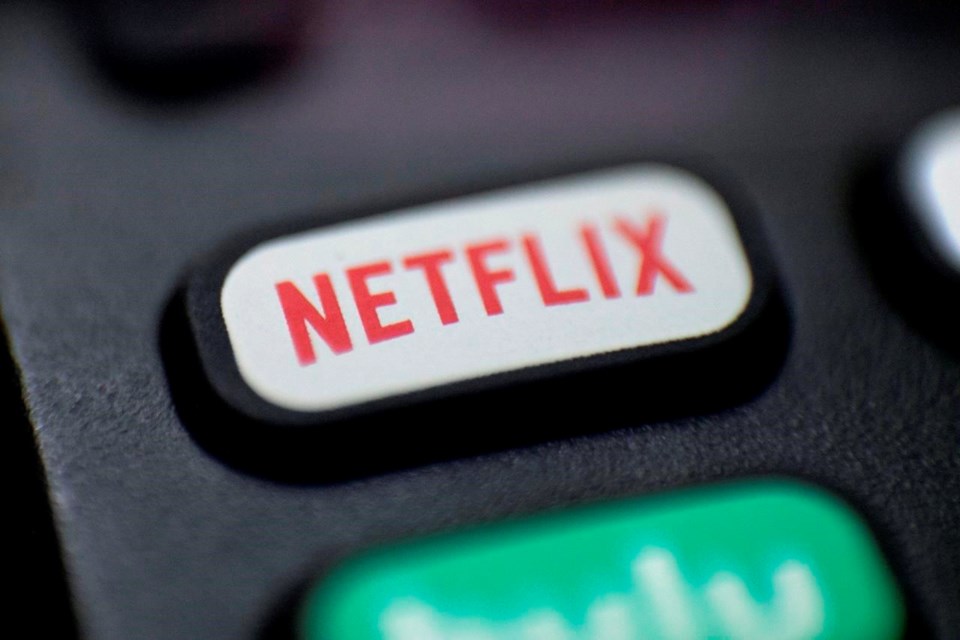TORONTO — Netflix's recent move to clamp down on password sharing could push customers to re-evaluate their subscriptions, say digital media experts.
They expect subscribers or people who piggybacked on their loved ones' accounts to have spent the last month evaluating how much they use the streaming service and whether it's worth the cost after Netflix began revising how it handles password sharing in Canada.Â
"To say that (sharing) wasn't permissible anymore, especially in this inflationary time, where people are looking at their credit card bill and thinking what can they wiggle out of or go without, they're making it easy for people to say no to Netflix," said Vass Bednar, a senior fellow at the Centre for International Governance Innovation.
The changes have already prompted some anger and many consumers have taken to social media to say they will cancel subscriptions, but how many people will act on those promises is yet to be seen.
"Is this actually hurting (Netflix) or is it just sentiment?" Bednar questioned.
The country will get closer to answering that question now that Netflix's Feb. 21 deadline to designate a "primary location" to Canadian accounts has passed. The location will eventually be used to recognize anyone who accesses the account outside the home base.
Netflix has not said how it will go about blocking access to those outside the primary location, but told premium and standard account holders they could buy access for extra users outside their home for $7.99 per month.Â
Premium high-definition 4K subscribers doling out $20.99 per month are allowed to add two extra members, each at that rate, while standard subscribers, who pay $16.49 per month, can add one additional member.Â
But convincing people to pay for a service they accessed for free and without recourse for so long is not easy.
"If you offer something for free or for cheap under certain terms, it's really hard to take that back because people get really angry," said Richard Lachman, an associate professor at Toronto Metropolitan University's RTA School of Media.
"Whereas if you launched it that way, they might not have batted an eye."
He suspects Netflix's move won't result in a massive subscriber revolt, but said "the little bit of friction" it has caused people with its decision "is never what you want."
In Netflix's case, he sees more consumers, especially younger and more tech-savvy ones, frequently switching between services rather than subscribing to many at the same time.
"They'll say, 'I am going to do Netflix and then cancel my subscription. When I have seen a bunch of things that are there, I am going to move to Disney or I'm going to move to Crave."
Others might turn to illicit streaming, he said.
"This extra hiccup of having now to pay an additional thing might lead to some increase in piracy again," Lachman said.
"Not all people are going to do it, not all people are going to be really savvy enough to do it, but it is a portion."
And the incentive to turn to illicit streaming may only increase, if rival streamers adopt Netflix's new policies likes Lachman predicts.
"It is quite likely that this will just become the industry standard," he said.
He feels this way because tech companies are known for engaging in "copycat behaviour," where they let rivals experiment with new models they will mirror after consumer reactions have been tested and best practices are developed.
The incentive to end password sharing is also high because subscriber numbers and growth projections have come under pressure as the number of streamers has multiplied in recent years.
While Netflix was the first of the major streamers to offer such a service, they have since been joined by Disney+, Crave, Paramount Plus and a slew of international and niche platforms with ballooning volumes of content.
"They used the tech playbook of grow at all costs to earn market share and then figure out profitability later and they probably underestimated that there would be copycats because they used to be the only game in town for streaming," said Bednar.
Last spring, Netflix reported its first subscriber loss in more than a decade, which was partially triggered by its decision to withdraw from Russia to protest the war against Ukraine, resulting in a loss of 700,000 subscribers.Â
It projected further losses were to come and within months rolled out its new anti-password-sharing plan.
This report by The Canadian Press was first published Feb. 22, 2023.
Tara Deschamps, The Canadian Press




